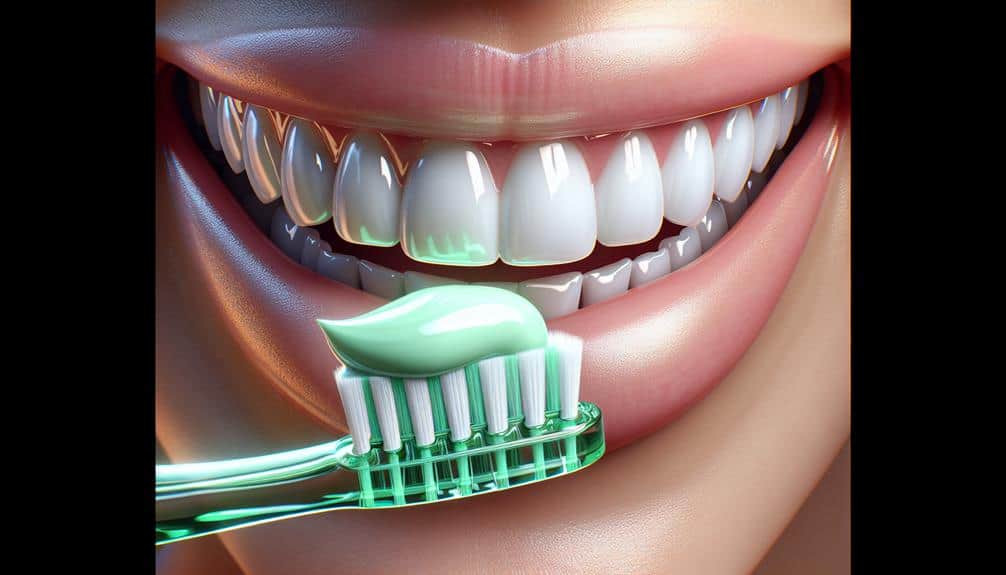Tea tree oil, with its antibacterial properties, fights harmful bacteria and removes stains and plaque, helping you achieve a thorough smile. It supports gum health, freshens breath, and acts as a natural mouthwash, all contributing to a brighter smile. For a thorough understanding of how tea tree oil boosts your smile, discover the various benefits it offers for your oral health.
Key Points
- Antibacterial properties fight harmful bacteria and support gum health.
- Removes stains and plaque, promoting overall oral health.
- Acts as a natural mouthwash, freshening breath effectively.
- Safe teeth whitening solution with anti-inflammatory benefits.
- Reduces plaque, fights gingivitis, and enhances oral hygiene.
Tea Tree Oil for Teeth Whitening
Using tea tree oil for teeth whitening can be a natural and effective way to brighten your smile. Tea tree oil, known for its antibacterial properties, can also play a role in oral hygiene. When it comes to teeth whitening, this essential oil can help remove stains and plaque buildup on the teeth, resulting in a cleaner and brighter smile.
Tea tree oil is a popular ingredient in natural remedies for oral care due to its ability to combat bacteria in the mouth. It has been shown to reduce the growth of bacteria that can lead to various oral health issues, making it a valuable addition to your oral hygiene routine. By incorporating tea tree oil into your teeth whitening regimen, you can benefit from its natural cleansing properties while also promoting overall oral health. Remember to use tea tree oil in moderation and consult with your dentist to make sure it complements your oral care routine effectively.
Anti-Bacterial Properties for Oral Health
Tea tree oil's antibacterial properties make it a valuable asset for promoting oral health by combating harmful bacteria in the mouth, contributing to overall hygiene and wellness.
When it comes to gum health and oral care, here are four ways tea tree oil's antibacterial properties can benefit you:
- Fight Against Bacteria: Tea tree oil's natural antibacterial properties help in fighting against harmful bacteria in the mouth, reducing the risk of infections and promoting healthier gums.
- Reduced Bad Breath: By targeting the bacteria that cause bad breath, tea tree oil can freshen your breath and improve your overall oral hygiene.
- Support Gum Health: Tea tree oil's antibacterial properties can help reduce inflammation and support gum health, aiding in the prevention of gum disease.
- Natural Oral Care: Incorporating tea tree oil into your oral care routine provides a natural way to maintain a clean and healthy mouth without harsh chemicals, promoting a more balanced oral environment.
Reduction of Plaque and Gingivitis
To improve oral health and combat common dental issues, reducing plaque and gingivitis is essential for maintaining a healthy smile. Tea tree oil has shown promise in plaque prevention and promoting gum health due to its antibacterial properties. Plaque is a sticky film of bacteria that forms on teeth, leading to tooth decay and gum disease if not properly managed. By incorporating tea tree oil into your oral care routine, you can help reduce the buildup of plaque on your teeth.
Studies have suggested that tea tree oil can be effective in reducing plaque formation and gingivitis when used as a mouthwash or in toothpaste. Its antimicrobial properties target the bacteria responsible for these oral health issues, helping to keep your gums healthy and prevent inflammation. By including tea tree oil in your dental hygiene regimen, you may experience improved gum health and a reduction in plaque buildup, ultimately contributing to a brighter, healthier smile.
Fresh Breath Benefits From Tea Tree Oil
For fresher breath and improved oral hygiene, incorporating tea tree oil into your dental routine can provide significant benefits. Tea tree oil is a powerful essential oil known for its antimicrobial properties, making it a great addition to your oral care regimen. Here are four ways tea tree oil can enhance your oral health:
- Mouthwash Alternative: Tea tree oil can be used as a natural mouthwash by adding a few drops to water. Its antibacterial properties help kill bacteria in the mouth, reducing bad breath and promoting overall oral health.
- Oral Hygiene Routine: Including tea tree oil in your oral hygiene routine can help control bacteria that cause bad breath. Brushing your teeth with toothpaste containing tea tree oil or adding it to your homemade toothpaste can be beneficial.
- Fresh Breath: Tea tree oil's ability to combat bacteria in the mouth can lead to fresher breath. It targets the source of bad breath, giving you long-lasting freshness.
- Reduced Plaque: By incorporating tea tree oil into your routine, you may experience a reduction in plaque buildup, which can contribute to fresher breath and improved oral health overall.
Safe and Natural Teeth Whitening Solution
In your journey for a brighter smile, exploring safe and natural teeth whitening solutions can be a beneficial step towards enhancing your dental aesthetics. When considering a natural alternative for enhancing your smile, tea tree oil emerges as a promising option. Tea tree oil's antibacterial properties can help combat plaque buildup, a common contributor to teeth yellowing. Additionally, its anti-inflammatory characteristics may aid in reducing gum inflammation, promoting overall oral health.
To create a teeth whitening paste using tea tree oil, mix a few drops of tea tree oil with baking soda to form a paste. Gently brush your teeth with this mixture for a couple of minutes, then rinse thoroughly. Keep in mind that natural remedies may take time to show noticeable results, so consistency is key when using this method.
While tea tree oil can be a safe and natural addition to your oral care routine, consult with your dentist before integrating it into your regimen, especially if you have sensitive teeth or existing dental conditions. By embracing this natural alternative, you can take a proactive approach towards brightening your smile and maintaining excellent dental health.
Frequently Asked Questions
Can Tea Tree Oil Be Used as a Replacement for Traditional Toothpaste?
Tea tree oil can be a natural alternative for oral hygiene. Consider DIY toothpaste with this essential oil. While it can enhance your smile, consult a dental professional before replacing regular toothpaste completely for thorough care.
Is There a Recommended Dosage or Frequency for Using Tea Tree Oil for Oral Health?
For best oral health, consider using tea tree oil in mouthwash or toothpaste. The suggested dosage is 1-2 drops per ounce of carrier oil. Safety is key; avoid swallowing. Use it 1-2 times daily for benefits like improved gum health.
Are There Any Potential Side Effects or Risks Associated With Using Tea Tree Oil in Oral Care?
You may experience mild skin irritation or allergic reactions with tea tree oil in oral care. It's important to do a patch test and consult a professional. Despite potential risks, it's valued for its effectiveness in oral health.
Can Tea Tree Oil Help With Sensitive Teeth or Gum Issues?
Tea tree oil can be beneficial for gum sensitivity and may help with tooth whitening. It is known for its antimicrobial properties, which can aid in reducing plaque buildup and preventing tooth decay.
Are There Any Specific Types or Brands of Tea Tree Oil That Are Recommended for Oral Care Purposes?
When it comes to tea tree oil for oral care, look for reputable brands like Thursday Plantation or ArtNaturals. Opt for 100% pure tea tree oil. Dilute properly and use sparingly. Always consult with your dentist for the best practices.



